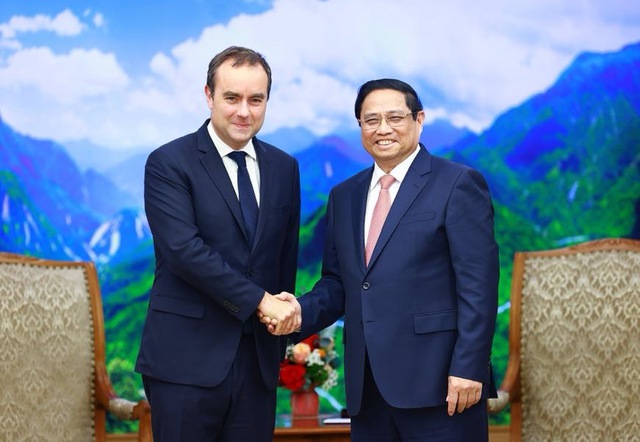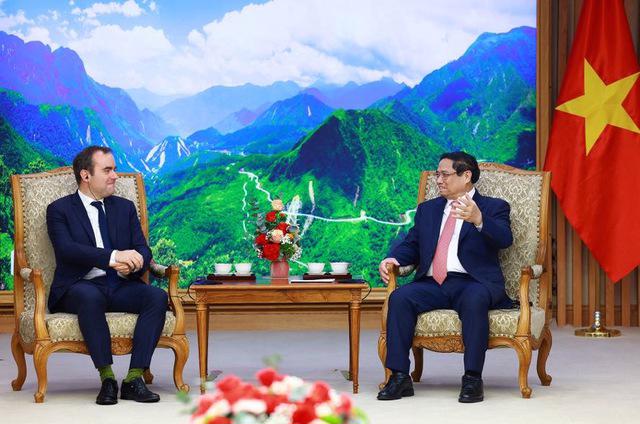The May 6th meeting between Vietnam's Prime Minister Pham Minh Chinh and France's Minister of the Army Sébastien Lecornu took place against a memorable backdrop: the 70th anniversary of Vietnam's decisive victory at Dien Bien Phu.
This historic event, which effectively ended French colonial rule in Indochina, casts a long shadow, and Minister Lecornu's presence at the anniversary commemoration signals a shift toward reconciliation and partnership.
The strategic significance of his visit is underscored by the fact that Lecornu is the first French military leader to visit the Dien Bien Phu battlefield. This gesture signifies a desire to reframe the two nations' intertwined history.
The French Ministry of The Army is formerly known as The French Ministry of Defense.
A Decade of Building Bridges
Prime Minister Chinh emphasized Vietnam's appreciation for the visit, highlighting it as a sign of progress within the Vietnam-France strategic partnership, formally established a decade ago. He reaffirmed both countries' efforts to "put aside the past, overcome differences, promote similarities, and look to the future.”
This aligns with Vietnam's broader approach to legacy conflicts, choosing to prioritize cooperation and progress.
The leaders acknowledged that the evolving partnership unfolds amidst a changing geopolitical landscape in the Indo-Pacific. Vietnam's firm "four no's" defense policy positions it as a strategically independent actor, committed to non-alignment and the peaceful resolution of international disputes.
Defense Cooperation Remains Key
The Prime Minister noted that defense cooperation has been, and remains, a key pillar of the Franco-Vietnamese relationship. France was the first Western nation to establish defense relations with Vietnam in 1991, marking a crucial step toward normalization.
Recent years have seen increased collaboration in various fields, with positive outcomes in joint military exercises and high-level dialogues.
Prime Minister Chinh proposed further strengthening the overall relationship with an emphasis on high-level exchanges. This includes a potential official visit to Vietnam by President Emmanuel Macron, a significant gesture that would elevate the bilateral partnership.

Economic Partnership and Shared Interests
Beyond defense, economic cooperation is central to the relationship. Vietnam seeks France's partnership in tackling the challenges of climate change, the transition to green energy, and the development of a robust digital economy.
France's technological expertise aligns with Vietnam's development priorities. Infrastructure projects like the Nhon – Hanoi Station metro offer opportunities for French involvement.
The Prime Minister also highlighted Vietnam's progress in addressing IUU fishing and reiterated his desire to see both the ratification of the Vietnam-EU Investment Protection Agreement (EVIPA) and the lifting of the 'yellow card' designation on Vietnamese seafood exports.
These steps would further bolster economic ties and demonstrate the effectiveness of cooperation.
The Dien Bien Phu Legacy
In 1954, the Viet Minh forces, led by General Vo Nguyen Giap, achieved a stunning victory against French forces at Dien Bien Phu. The battle, a grueling 56-day siege, marked a turning point in the First Indochina War and ultimately led to France's withdrawal from the region. The victory became a symbol of Vietnamese resistance and determination.
The legacy of war and colonialism hangs heavy, and the leaders' focus on defense cooperation extends to addressing enduring problems like unexploded ordnance and identifying those missing in action.
Prime Minister Chinh's specific request for increased French cooperation in preserving and restoring the historical value of the Dien Bien Phu Battlefield relic, including sharing archival documents, marks a step toward confronting shared historical pain with a spirit of partnership.
Regional Dynamics
The leaders' exchange also addressed matters of regional and international concern. They emphasized the importance of maintaining peace, stability, and freedom of navigation in the East Sea.
Both countries support upholding international law, including the 1982 UNCLOS, and advocate for the peaceful resolution of disputes – positioning themselves alongside other nations concerned about growing regional tensions.
The Path to Partnership
Prior to Minister Lecornu's visit, Dien Bien Phu had already witnessed a thawing of relations through high-level visits from France.
In 1993, former French President Francois Mitterrand became the first French head of state to visit the battlefield, acknowledging the significance of the event from the Vietnamese perspective.
This paved the way for a subsequent visit in 2018 by then-French Prime Minister Edouard Philippe, further solidifying the commitment to move beyond the past and forge a more positive future.
Lecornu's visit, however, holds a distinct weight as the first by a French military leader. This act of respect for a site that represents a significant Vietnamese victory underscores France's evolving perspective on its colonial past and its commitment to building a future-oriented partnership with Vietnam. It proves that former adversaries can indeed create a more cooperative future built on mutual respect.









 Google translate
Google translate